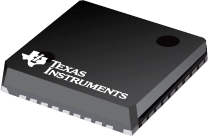Datasheet Texas Instruments LMZ31704
| Manufacturer | Texas Instruments |
| Series | LMZ31704 |

SIMPLE SWITCHERВ® 2.95V to 17V, 4A Power Module with Current Sharing
Datasheets
LMZ31704 4-A SIMPLE SWITCHERВ® Module, 2.95-V to 17-V Input and Current Sharing datasheet
PDF, 1.5 Mb, Revision: B, File published: Jun 7, 2017
Extract from the document
Status
| LMZ31704RVQR | LMZ31704RVQT | |
|---|---|---|
| Lifecycle Status | Active (Recommended for new designs) | Active (Recommended for new designs) |
| Manufacture's Sample Availability | No | Yes |
Packaging
| LMZ31704RVQR | LMZ31704RVQT | |
|---|---|---|
| N | 1 | 2 |
| Pin | 42 | 42 |
| Package Type | RVQ | RVQ |
| Industry STD Term | B3QFN | B3QFN |
| JEDEC Code | S-PQFP-N | S-PQFP-N |
| Package QTY | 500 | 250 |
| Carrier | LARGE T&R | SMALL T&R |
| Device Marking | 54020 | 54020 |
| Width (mm) | 10 | 10 |
| Length (mm) | 10 | 10 |
| Thickness (mm) | 4.3 | 4.3 |
| Pitch (mm) | .8 | .8 |
| Max Height (mm) | 4.4 | 4.4 |
| Mechanical Data | Download | Download |
Parametrics
| Parameters / Models | LMZ31704RVQR | LMZ31704RVQT |
|---|---|---|
| Iout(Max), A | 4 | 4 |
| Operating Temperature Range, C | -40 to 85 | -40 to 85 |
| Package Size: mm2:W x L, PKG | 42B3QFN: 100 mm2: 10 x 10(B3QFN) | 42B3QFN: 100 mm2: 10 x 10(B3QFN) |
| Package Type | QFN | QFN |
| Regulated Outputs | 1 | 1 |
| Soft Start | Adjustable | Adjustable |
| Special Features | Current Sharing,EMI Tested,Frequency Synchronization,Power Good,Remote Sense,Tracking,Light Load Efficiency | Current Sharing,EMI Tested,Frequency Synchronization,Power Good,Remote Sense,Tracking,Light Load Efficiency |
| Switching Frequency(Max), kHz | 1200 | 1200 |
| Switching Frequency(Min), kHz | 200 | 200 |
| Switching Frequency(Typ), kHz | 1000 | 1000 |
| Vin(Max), V | 17 | 17 |
| Vin(Min), V | 2.95 | 2.95 |
| Vout(Max), V | 5.5 | 5.5 |
| Vout(Min), V | 0.6 | 0.6 |
Eco Plan
| LMZ31704RVQR | LMZ31704RVQT | |
|---|---|---|
| RoHS | Not Compliant | Not Compliant |
Application Notes
- Using LMZ31710 for Higher Output VoltagesPDF, 95 Kb, File published: Nov 9, 2015
The LMZ31710 power module has been designed and characterized for operation at output voltages from0.6 V to 5.5 V. However, several applications require higher voltages than the standard point-of-loadvoltages that the LMZ31710 is designed for. Following the guidance in this application note, theLMZ31710 can be used for output voltages up to 9.5 V. All data included in this application note h - LMZ31710, LMZ31707, LMZ31704 ParallelPDF, 217 Kb, File published: Jul 2, 2013
The LMZ31710 is a 2.95-V to 17-V input, 10-A output, integrated power solution which integrates the PWM controller, power MOSFETs, inductor and passives in a low-profile, QFN package. For applications requiring greater than 10 A, it is possible to parallel up to six LMZ31710 devices by following the recommendations in this paper. - Power Module MSL RatingsPDF, 137 Kb, File published: Jan 20, 2017
All semiconductor devices, including power modules that have a moisture sensitivity level (MSL) rating and a peak reflow classification, which provides needed information when manufacturing with the device. This application report helps to explain these ratings. - Powering LMZ3 SIMPLE SWITCHER Power Modules From 3.3 VPDF, 38 Kb, File published: Jul 2, 2013
LMZ31503 Powering LMZ3 SIMPLE SWITCHERВ® Power Modules from 3.3V - Adjusting LMZ3 Output Voltage with LM10010/1PDF, 87 Kb, File published: Feb 11, 2014
ThisapplicationnoteoutlinesthemethodstopairanLMZ3powermodulewithanLM10010/1VIDvoltageprogrammertoadjusttheoutputvoltage.TheLMZ3powermoduleisaneasy-to-useintegratedpowersolutionwhichcombinesaDC/DCconverterwithpowerMOSFETs,ashieldedinductor,andpassivecomponentsintoalowprofileQFNpackage,whilest - Working With QFN Power Modules (Rev. A)PDF, 1.7 Mb, Revision: A, File published: Jun 8, 2017
TexasInstrumentsQuadFlatpackNo-lead(QFN)powermodulesallowfor boardminiaturization,and holdseveraladvantagesoverotherpowermodulepackages.The QFNpackageshavehigherpowerdensity,asmallerroutingarea,improvedthermalperformance,and improvedelectricalparasitics.Additionally,theabsenceof externalleadseliminatesbent-leadconc - Soldering Requirements for BQFN Packages (Rev. B)PDF, 737 Kb, Revision: B, File published: Jun 8, 2017
This documentoutlinesthe solderingrequirementsfor the TPS84and LMZ3devicefamilies - Uninterruptible Synchronization Clock CircuitPDF, 74 Kb, File published: Nov 22, 2013
- AN-1520 A Guide to Board Layout for Best Thermal Resistance for Exposed Packages (Rev. B)PDF, 9.2 Mb, Revision: B, File published: Apr 23, 2013
This thermal application report provides guidelines for the optimal board layout to achieve the best thermalresistance for exposed packages. The thermal resistance between junction-to-ambient (ОёJA) is highlydependent on the PCB (Printed Circuit Board) design factors. This becomes more critical for packageshaving very low thermal resistance between junction-to-case such as exposed pad TSSOP - AN-2155 Layout Tips for EMI Reduction in DC/ DC Converters (Rev. A)PDF, 3.6 Mb, Revision: A, File published: Apr 23, 2013
This application note will explore how the layout of your DC/DC power supply can significantly affect theamount of EMI that it produces. It will discuss several variations of a layout analyze the results andprovide answers to some common EMI questions such whether or not to use a shielded inductor. - AN-2162 Simple Success With Conducted EMI From DC-DC Converters (Rev. C)PDF, 2.5 Mb, Revision: C, File published: Apr 24, 2013
Electromagnetic Interference (EMI) is an unwanted effect between two electrical systems as a result ofeither electromagnetic radiation or electromagnetic conduction. EMI is the major adverse effect caused bythe application of switch-mode power supplies (SMPS). In switching power supplies EMI noise isunavoidable due to the switching actions of the semiconductor devices and resulting disconti - Semiconductor and IC Package Thermal Metrics (Rev. C)PDF, 201 Kb, Revision: C, File published: Apr 19, 2016
- QFN and SON PCB Attachment (Rev. B)PDF, 821 Kb, Revision: B, File published: Aug 24, 2018
- Input and Output Capacitor SelectionPDF, 219 Kb, File published: Sep 19, 2005
Model Line
Series: LMZ31704 (2)
Manufacturer's Classification
- Semiconductors> Power Management> Power Modules> Non-Isolated Module> Step-Down (Buck) Module